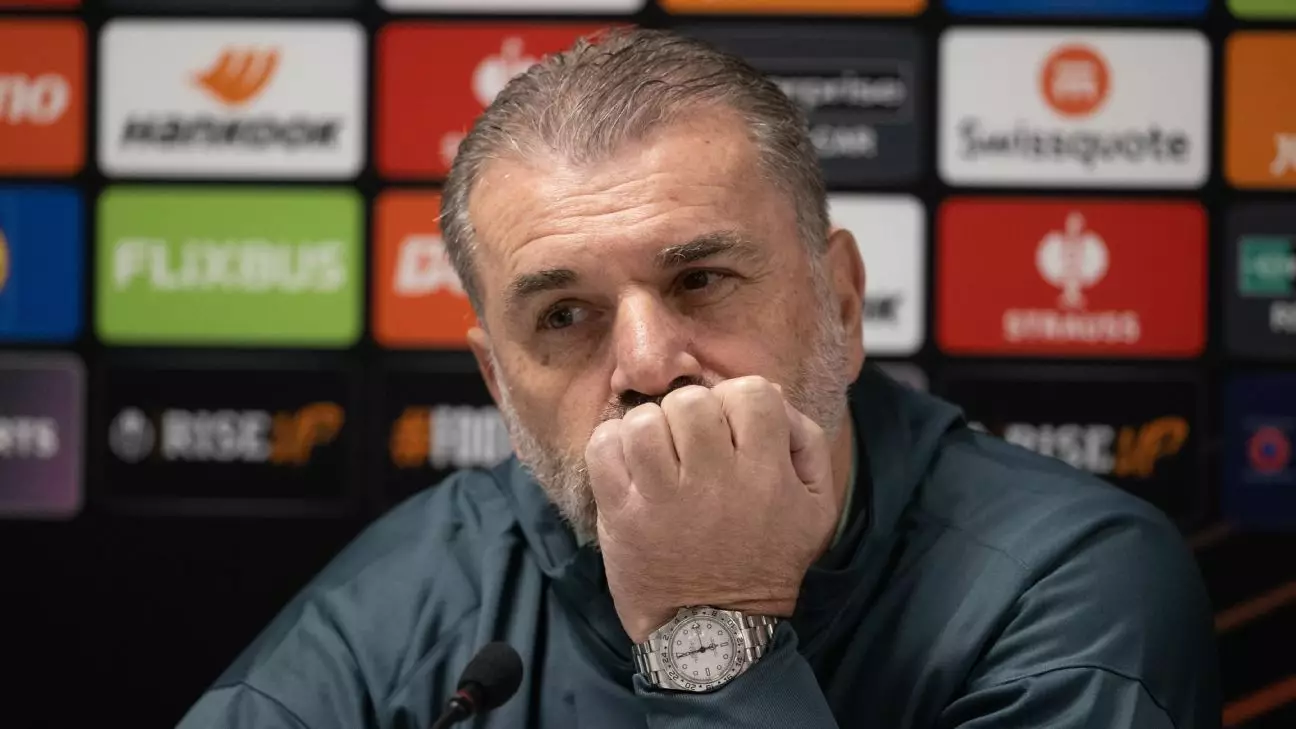The recent turmoil at Tottenham Hotspur encapsulates the challenges and strains that come with high expectations in professional football. With head coach Ange Postecoglou navigating the stormy waters of media scrutiny and player discontent, the situation emphasizes the complexities inherent in managing a top-tier football club. The recent commentary by Argentine defender Cristian Romero sheds light on internal frustrations, reflecting deeper issues within the Spurs’ structure. This article delves into the implications of these events both on and off the pitch.
Cristian Romero, a key defensive asset for Tottenham, recently sparked controversy with his candid remarks regarding the club’s leadership in the aftermath of a disappointing 4-3 defeat to Chelsea. Critiquing Spurs’ financial approach compared to their rivals, Romero articulated a sentiment many fans and players share; the club has consistently underperformed relative to its potential, primarily due to inadequate investment. He remarked that the cycle of disappointment persists because the same individuals bear the responsibility for the failures, indicating a need for accountability and change.
However, the manner in which he delivered this critique—a public interview—has drawn the ire of coach Ange Postecoglou. While acknowledging that some of Romero’s points were valid, Postecoglou was clear that discussing internal issues publicly undermines team unity and professionalism. The coach’s emphasis on resolving conflicts within the team’s private domain illustrates a commitment to maintaining a cohesive team environment. Romero’s subsequent apology to Postecoglou underscores that sometimes, even the most passionate dissent can be counterproductive in a team setting.
Adding to the club’s woes is a growing injury crisis that has left them without crucial players like Romero and Micky van de Ven. The absence of these key defenders not only jeopardizes Spurs’ immediate performances but also raises questions about the overall squad depth and management strategy. With Postecoglou characterizing this as the worst injury crisis of his managerial career, the pressure intensifies as he prepares to deploy makeshift solutions in the heart of defense.
The potential reliance on inexperienced talent like 18-year-old Archie Gray highlights the precarious situation Tottenham finds themselves in—a reflection not just of their current state but of their long-term planning and investment in youth. While Gray’s versatility might benefit the team in a pinch, the inherent risks of fielding inexperienced players against seasoned opponents like Rangers in the Europa League could backfire, damaging confidence and further complicating their campaign.
Ange Postecoglou’s return to Scotland, where he thrived as Celtic’s manager, presents a dual narrative—one of nostalgia and fierce competition. Although his past accolades may grant him a sense of familiarity and perhaps support from fans, the pressing challenge remains: to galvanize a squad besieged by injuries and dissatisfaction. The pressures of professional football can weigh heavily on a coach, especially when results fail to meet the high standards expected at a club like Tottenham.
The upshot of these challenges could lead to strategic shifts in both player roles and tactical approaches. Postecoglou’s suggestion that he might have to “get creative” speaks volumes; adaptability will be crucial in navigating the upcoming matches. The Spurs must tread carefully as they attempt to regain form while fostering a more positive internal culture, especially in light of Romero’s comments and their implications.
Five matches into their Europa League campaign, Spurs find themselves on shaky ground as they languish below automatic qualification places for the knockout stages. This precarious position not only impacts morale but also heaps additional pressure on the managing staff, who must work diligently to rectify the situation. A performance against Rangers could be a transformative event—a chance to regroup, rally, and refocus amidst widespread discontent.
For their part, Rangers coach Philippe Clement has expressed optimism about his side’s capacity to upset their higher-ranked Premier League opponents. This theme of seizing opportunity resonates in football—on any given match day, underdogs have the potential to transcend their limitations, driven by fervor and unexpected resolve.
As the saga unfolds, the spotlight remains on Postecoglou and his ability to galvanize a splintered squad, hold meaningful discussions behind closed doors, and combat the looming threats of injury and criticism. The future is uncertain, but the resolve and adaptability demonstrated in the coming weeks will be pivotal in determining whether Tottenham can overcome their current malaise and refocus on their quest for domestic and European glory.

